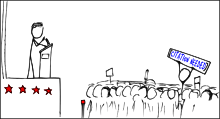
Back استشهاد Arabic Sitat AZ Академично цитиране Bulgarian Citati BS Citació Catalan Citace Czech Kildehenvisning Danish Quellenangabe German Referencia bibliográfica Spanish Aipu eta erreferentzia bibliografikoak EU
| Part of a series on |
| Research |
|---|
 |
| Philosophy portal |

A citation is a reference to a source. More precisely, a citation is an abbreviated alphanumeric expression embedded in the body of an intellectual work that denotes an entry in the bibliographic references section of the work for the purpose of acknowledging the relevance of the works of others to the topic of discussion at the spot where the citation appears.
Generally, the combination of both the in-body citation and the bibliographic entry constitutes what is commonly thought of as a citation (whereas bibliographic entries by themselves are not).
Citations have several important purposes. While their uses for upholding intellectual honesty and bolstering claims are typically foregrounded in teaching materials and style guides (e.g.,[2][3]), correct attribution of insights to previous sources is just one of these purposes.[4] Linguistic analysis of citation-practices has indicated that they also serve critical roles in orchestrating the state of knowledge on a particular topic, identifying gaps in the existing knowledge that should be filled or describing areas where inquiries should be continued or replicated.[5] Citation has also been identified as a critical means by which researchers establish stance: aligning themselves with or against subgroups of fellow researchers working on similar projects and staking out opportunities for creating new knowledge.[6]
Conventions of citation (e.g., placement of dates within parentheses, superscripted endnotes vs. footnotes, colons or commas for page numbers, etc.) vary by the citation-system used (e.g., Oxford,[7] Harvard, MLA, NLM, American Sociological Association (ASA), American Psychological Association (APA), etc.). Each system is associated with different academic disciplines, and academic journals associated with these disciplines maintain the relevant citational style by recommending and adhering to the relevant style guides.
- ^ Munroe, Randall. "Wikipedian Protester". xkcd. Archived from the original on 25 December 2011. Retrieved 25 May 2020.
- ^ "What Does it Mean to Cite?". MIT Academic Integrity. Archived from the original on 2017-07-10. Retrieved 2015-09-28.
- ^ Association of Legal Writing Directors & Darby Dickerson, ALWD Citation Manual: A Professional System of Citation, 4th ed. (New York: Aspen, 2010), 3.
- ^ Mansourizadeh, Kobra, and Ummul K. Ahmad. "Citation practices among non-native expert and novice scientific writers." Journal of English for Academic Purposes 10, no. 3 (2011): 152–161.
- ^ Swales, J. M. (2004). Research genres: Explorations and applications. Cambridge University Press. 10.1017/CBO9781139524827
- ^ Hyland, K., & Jiang, F. (2019). Points of reference: Changing patterns of academic citation. Applied Linguistics, 40(1), 64–85.
- ^ "Oxford Referencing System". Archived from the original on 30 June 2017. Retrieved 18 January 2011.